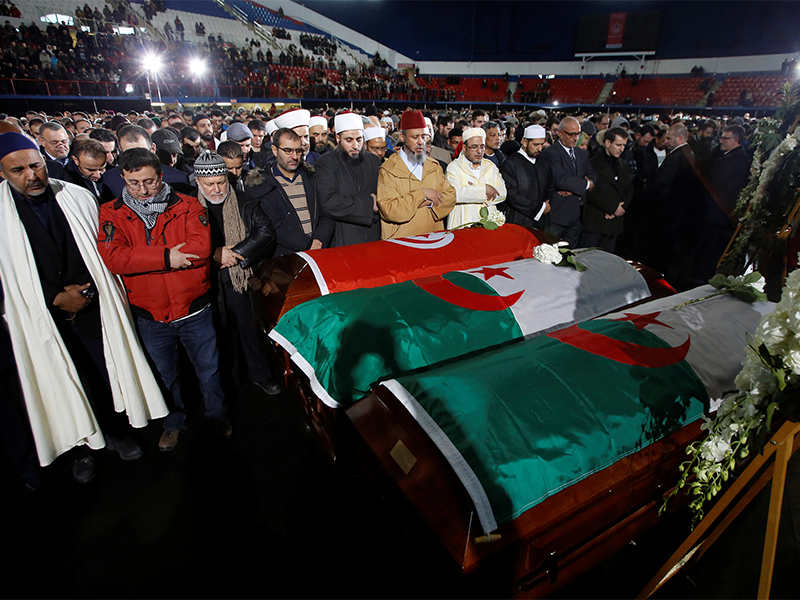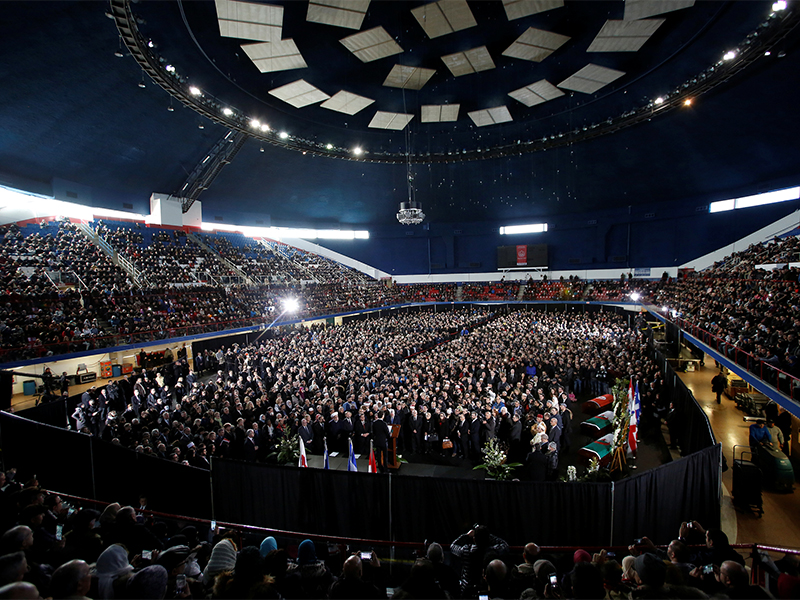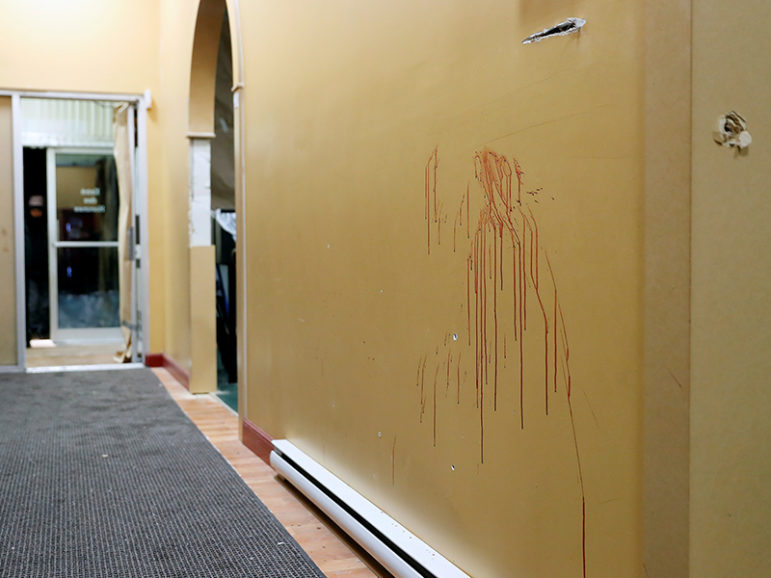TORONTO (RNS) Bullet holes and blood splatter still marked the walls. Carpets were stained. Even shoes and boots, removed before prayers and lined up, stood abandoned.
Days after Sunday’s (Jan. 29) shooting that left six men dead and more than a dozen wounded at a mosque in Quebec City, signs of the horror were still there for all to see.
“We’re showing these images so that people who try to sow hate and increase Islamophobia stop,” Mohammed Labidi, the vice-president of the Centre Culturel Islamique de Quebec, told CBC News. “Hate can lead to carnage, to the loss of innocent life, and that’s what happened in this mosque.”
Funerals for three of the victims were held Thursday in Montreal with a fourth service held in Quebec City on Friday (Feb 3).

Mourners pray during a funeral ceremony for three of the victims of the deadly shooting at the Quebec Islamic Cultural Centre, in Montreal, Quebec, Canada, on Feb. 2, 2017. Photo courtesy of Reuters/Chris Wattie *Editors: This photo may only be republished with RNS-QUEBEC-AFTERMATH, originally published on Feb. 3, 2017.
Muslims in Quebec City say they no longer feel safe. But for several years before the shooting, expressions of intolerance had been on the increase, said Haroun Bouazzi, leader of the Association of Muslims and Arabs for a Secular Quebec.
“We have been seeing a huge amount of hatred against Muslim minorities here in Quebec,” said Bouazzi, who added that he too has received death threats. “All of the mosques have been the subjects of hate.”
[ad number=“1”]
The Centre Culturel Islamique de Quebec was vandalized a number of times in the past, with swastikas drawn on the building’s walls. During Ramadan last summer a decapitated pig’s head was gift-wrapped and left on the mosque’s doorstep with a note that read, “bon appetit.” And a pamphlet was circulated which made accusations that the mosque was linked with terrorists.
Some precautions were taken in response, such as installing security cameras in and around the building, but the mosque was still unprepared for the shooting.
The accused shooter is a 27-year old Quebec man, Alexandre Bissonnette, who appears to have been influenced by far-right political rhetoric, including statements by U.S. President Trump and French politician Marine Le Pen.
Benjamin Ducol, the head of research for the Centre for the Prevention of Radicalization Leading to Violence in Quebec, says radicalization is working on both extremes.
“Obviously we have witnessed, over the last few years, many attacks coming from jihadi groups. These jihadi groups have kind of polarized the views of the general population about Islam and Muslims,” he said.
[ad number=“2”]
“It’s kind of fitting the narratives of the extremist groups, and in that case the event of Sunday is going to also fit the narrative of jihadi groups that see Muslims and Islam as under attack.”
Political leaders across the country have implored Canadians to stand united against such acts of hatred.
“Quebec and Canada have to remain a beacon of tolerance,” Philippe Couillard, the Premier of Quebec, said at a news conference Monday. “It’s normal in times of crisis to talk about inclusion, but the real challenge will be to maintain that two weeks from now.”

Canada’s Prime Minister Justin Trudeau speaks during funeral ceremonies for three of the victims of the deadly shooting at the Quebec Islamic Cultural Centre, in Montreal, Quebec, Canada, on Feb. 2, 2017. Photo courtesy of Reuters/Chris Wattie *Editors: This photo may only be republished with RNS-QUEBEC-AFTERMATH, originally transmitted on Feb. 3, 2017.
Vigils have been held in cities across the country, from Quebec City itself, where Prime Minister Justin Trudeau addressed the families of the victims, to the east coast port of Halifax, where hundreds gathered for a candlelight ceremony on the city’s Grand Parade, to Iqaluit in the Northwest Territories, where local residents crowded the city’s only mosque in a show of solidarity.
In Toronto, Christian, Jewish and Muslim leaders came together to offer prayers for peace and unity.
[ad number=“3”]
Quebec City Cardinal Gerald Cyprien Lacroix decried the shooting, explaining that “whether we are Christians or not, an act of violence such as that experienced at the Grand Mosque of Quebec touches us all.”
He promised that the people of Quebec would “respond to these hateful acts through our solidarity and pledge ourselves to continue building a society where social peace and respect for all cultures guide our daily lives.”
“We are all touched by the solidarity, and it warms our heart and lessens our sorrow,” said Labidi, the mosque vice president, one of many Muslims touched by the outpouring of support.
“We have to keep hope in humanity in spite of all the terrible things,” said Karim Elabed, an imam at a local mosque. “We lost six friends, six brothers. Nonetheless, we took and kept the love of an entire population, of all Quebecois, every Canadian and everyone around the entire planet. We will have to rebuild on that.”
(Daniel Matos is a writer based in Toronto)





